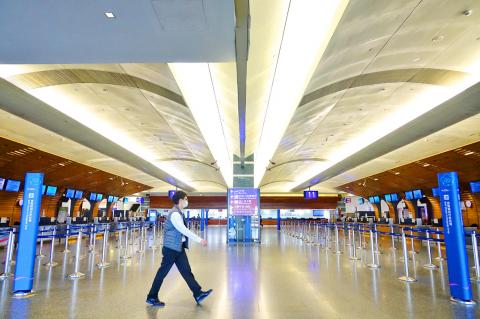The Ministry of Transportation and Communications (MOTC) yesterday said that it plans to upgrade the travel industry amid a COVID-19 epidemic by offering professional training subsidies to people working in the sector.
The spread of the disease from China to other nations has dealt a severe blow to Taiwan’s tourism industry, which prompted the ministry to budget NT$4.4 billion (US$146.24 million) to help business operators weather industry headwinds, it said.
The ministry is compensating travel agents for the financial losses they sustained for cutting short Chinese visitors’ tours in Taiwan, and suspending trips to China, Hong Kong and Macau in compliance with the government’s disease-prevention policy.

Photo: Liu Hsin-de, Taipei Times
The ministry yesterday announced that it plans to use NT$800 million from the budget to offer professional training to people working in the tourism industry, including employees of travel agencies as well as tour guides, tour bus drivers and taxi drivers.
According to the plan, NT$500 million would be used to train travel industry workers, while NT$300 million would be spent on training people working in transportation businesses.
The two programs would be overseen by the Tourism Bureau and the Directorate-General of Highways respectively, the ministry said.
The travel industry and transportation businesses are facing unprecedented challenges due to the COVID-19 epidemic, Deputy Minister of Transportation and Communications Wang Kwo-tsai (王國材) said.
They might be going through a crisis, but it might turn out to be an opportunity to equip themselves with more professional knowledge, he said.
The bureau would entrust business associations in the travel industry and travel service workers’ unions to host training seminars for their members, Wang added.
Each seminar must limit its expenses to NT$3 million, which must also cover an NT$158 hourly subsidy per trainee and other administrative fees, Wang said.
Each trainee may attend up to 120 hours of seminars per month, he said.
Trainees would learn to use digital technology to market their services and change their business models, Wang said.
Training organizers are encouraged to host seminars in different localities, for which they would have to lease tour buses.
Trainees, on the other hand, would have to stay in hotels and could shop in tourist destinations, he said, adding that this would help revive tourism.
Employers would receive training subsides if they agree to retain their employees instead of furloughing them, he added.
Tour guides and taxi drivers who work independently would receive subsidies directly from the bureau, Wang said.
Minister of Transportation and Communications Lin Chia-lung (林佳龍) has agreed to increase subsidies for professional training if demand exceeds the estimates, Wang said.
The ministry would also invite a group of experts to conduct a comprehensive inspection of the nation’s tourism industry and tourist destinations, and propose projects to enhance the nation’s travel service quality and upgrade the facilities in the destinations, Wang said.
The projects would be funded by a ministry program to upgrade and transform the tourism industry, which would cost NT$30 billion and would be submitted to the Executive Yuan in June, he said.
Meanwhile, the ministry has also budgeted NT$4.863 billion to help the nation’s airlines, as they have been forced to cancel flights or suspend flight services to certain regions due to the government’s disease-prevention policy and a decline in passengers, it said.

The Grand Hotel Taipei on Saturday confirmed that its information system had been illegally accessed and expressed its deepest apologies for the concern it has caused its customers, adding that the issue is being investigated by the Ministry of Justice Investigation Bureau. The hotel said that on Tuesday last week, it had discovered an external illegal intrusion into its information system. An initial digital forensic investigation confirmed that parts of the system had been accessed, it said, adding that the possibility that some customer data were stolen and leaked could not be ruled out. The actual scope and content of the affected data

‘LIKE-MINDED PARTNER’: Tako van Popta said it would be inappropriate to delay signing the deal with Taiwan because of China, adding he would promote the issue Canadian senators have stressed Taiwan’s importance for international trade and expressed enthusiasm for ensuring the Taiwan-Canada trade cooperation framework agreement is implemented this year. Representative to Canada Harry Tseng (曾厚仁) in an interview with the Central News Agency (CNA) said he was increasingly uneasy about Ottawa’s delays in signing the agreement, especially as Ottawa has warmed toward Beijing. There are “no negotiations left. Not only [is it] initialed, we have three versions of the text ready: English, French and Mandarin,” Tseng said. “That tells you how close we are to the final signature.” Tseng said that he hoped Canadian Prime Minister Mark Carney

POSITIVE DEVELOPMENT: Japan and the US are expected to hold in-depth discussions on Taiwan-related issues during the meeting next month, Japanese sources said The holding of a Japan-US leaders’ meeting ahead of US President Donald Trump’s visit to China is positive news for Taiwan, former Japan-Taiwan Exchange Association representative Hiroyasu Izumi said yesterday. After the Liberal Democratic Party’s landslide victory in Japan’s House of Representatives election, Japanese Prime Minister Sanae Takaichi is scheduled to visit the US next month, where she is to meet with Trump ahead of the US president’s planned visit to China from March 31 to April 2 for a meeting with Chinese President Xi Jinping (習近平). Japan and the US are expected to hold in-depth discussions on Taiwan-related issues during the

President William Lai (賴清德) yesterday bestowed one of Taiwan’s highest honors on Saint Vincent and the Grenadines (SVG) Ambassador Andrea Clare Bowman in recognition of her contributions to bilateral ties. “By conferring the Order of Brilliant Star with Grand Cordon on Ambassador Bowman today, I want to sincerely thank her, on behalf of the Taiwanese people, for her outstanding contribution to deepening diplomatic ties between Taiwan and SVG,” Lai said at a ceremony held at the Presidential Office in Taipei. He noted that Bowman became SVG’s first ambassador to Taiwan in 2019 and